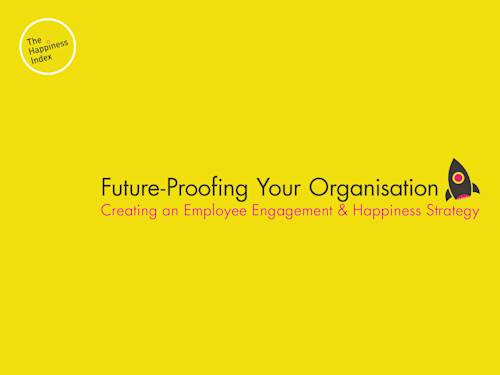
Creating an Employee Engagement AND Happiness Strategy
Last week news broke that workers of an Amazon warehouse in New York have voted to unionise. This is the first time workers have been able to break through Amazon’s costly union busting process. Although this may seem a long way from the UK, we here at The Happiness Index think there are some learnings we can take away even this side of the pond.
It’s not just Amazon warehouse employees who are unionising - Starbucks and even a subdivision of Microsoft are also facing unionisation in the US. Here in the UK union membership is higher than in the US, but what can non-unionised workplaces learn from what is happening in the States?
For years Starbucks has been calling its employees “partners” but, a reckoning is taking place where their people are starting to question what “partnership” means. The Starbucks workers are asking to be able to negotiate as equals. This levelling of historical hierarchies is taking place globally, not just within Starbucks.
People are starting to realise that the top-down leadership model which started in the industrial revolution is outdated. They’re looking for equality, respect and a level footing. This isn’t unique in the US. The great resignation shows that people are dissatisfied with current working models globally.
One of the main motivating factors in the move for Amazon to unionise was around employee safety. Although not everyone works in manual labour to the extent that Amazon warehouse workers do, there’s an element of safety in everyone’s workplace. Whether we’re looking at physical or psychological safety, creating a workplace where people have an environment and relationships in which they feel safe and comfortable is key.
Not thinking about safety poses a real risk, not only to your employees but also to your bottom line. Neuroscience shows that our brains don’t know the difference between psychological and physical danger - we react in the same way. This means it’s vital to listen to your people and understand where their stress points are coming from.
There’s a temptation to act as though money isn’t a factor in the moves to unionise. Sometimes in our culture it feels indelicate to talk about money, and recognising that people want or need more money can be seen as undermining their message. But, at the end of the day, everyone has mortgage payments to meet, mouths to feed, and bills to pay. With inflation high, and cost of living ballooning, people need more money.
At THI, we believe that it is incumbent on businesses to create financial safety for their people. Researchers have consistently found that the answer to the question “does money make you happy?” is yes. Obviously there’s a little more to it than that, but money is incredibly important to how happy and fulfilled we feel at work.
Our biggest take away from the move to unionise is that people want to be listened to. However, the fact that Amazon claimed to want a direct relationship with their people is telling. It’s not enough to listen without action. Organisations need to build trust internally in order for a direct relationship to mean anything.
This means a communication and action plan that builds accountability and momentum from the start of a listening strategy. We can and do work with unions and employee groups to create a bridge with management when it comes to fostering employee engagement and building workplace happiness. We believe passionately that we can help organisations create an atmosphere of trust.

Linked to Happiness & Engagement in our neuroscience methodology... learn more
The Happiness Index helps organisations measure the key employee engagement AND happiness drivers to power their people strategy.
Our unique platform offers the products, insights and tools to shine a light on your cultural health and empower management to drive thriving cultures.
Our neuroscience-based pre-built surveys measure the full employee experience - from onboarding to exit to empower and enable organisations to understand their people and create data-led action plans.
